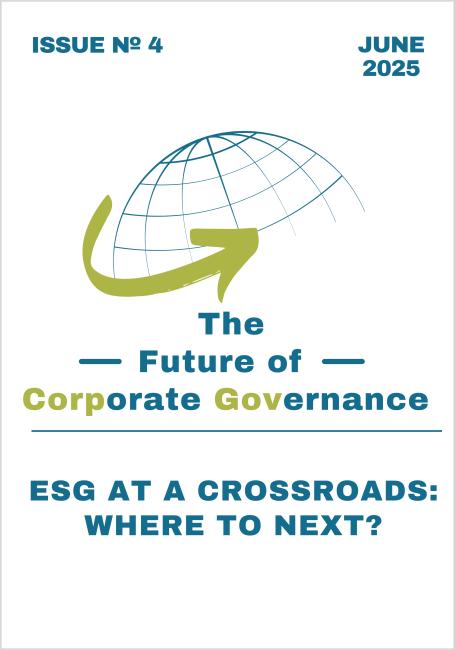
The ECGI blog is kindly supported by

Interview with Enrichetta Ravina on Polarization and the Future of ESG
This interview is based on the research of Professor Enrichetta Ravina, whose work explores the intersection of finance, investor behaviour, and political ideology. It draws particularly on her recent papers, including “ESG Choice with Polarized Investors.”
________________________________
You’ve written about how ideology shapes investor decisions. To what extent is the ESG backlash really about investment strategy — and to what extent is it about identity or political signaling?
Both dimensions drive the ESG backlash. Legitimate concerns about financial materiality- whether ESG factors genuinely improve risk-adjusted returns or represent a drag on performance – and the fact that many ESG metrics are low-quality and disagree with each other are certainly contributing factors.
But ESG stances also increasingly reflect investor polarization about business's role in society. Investors don't just differ on acceptable financial trade-offs for ESG goals—they hold fundamentally different values about regulation, social change, and corporate power, and increasingly want their voices being heard. Politicians and activists from both sides use ESG as a lightning rod, pressuring companies and shareholders to advance their agendas, and recent years have seen an increased opposition to ESG by investors and citizens that feel disenfranchised by what they consider pro-ESG stances of large corporations and financial institutions.
In your recent paper on “ESG Choice with Polarized Investors,” you show how offering ESG and non-ESG options can help preserve investor satisfaction. But does choice resolve the core conflict — or just mask it?
Choice manages conflict but doesn't resolve it. My research with Nicola Persico shows that small funds cater to polarized positions, allowing ESG-oriented and return-focused investors to self-select.
However, pro- and anti-ESG funds represent less than 1.5% of U.S. assets under management. The real power lies with large funds that dominate employer retirement plans and pensions. These institutions have moderate ESG stances that compromise across the heterogeneous ideologies of their many investors and ultimately control corporate policies—which is a reason why politicians and activists target large fund families like BlackRock.
We show that giving individual investors direct voting power or allowing delegation to "political entrepreneurs" would likely produce more extreme corporate ESG policies reflecting underlying polarization.
From BlackRock’s rebranding to S&P dropping ESG scores, we’re seeing financial institutions soften their ESG language. Do you think this shift is a strategic response to polarization — or a sign of deeper retreat?
This reflects both strategic messaging and a deeper retreat. Large financial institutions face an impossible position: they must follow fiduciary duty, attract assets from investors with heterogeneous values, and avoid political crosshairs as anti-ESG movements intensify.
Many firms are adapting messaging while maintaining practices—BlackRock dropped explicit ESG terminology but continues climate-focused investing. Many firms are reframing ESG factors as "material risk assessment" or "long-term value creation".
But signs also point to a deeper retreat. The speed and breadth of the rebranding reflects the fact that in the current political climate ESG has become a liability. The question is whether this represents a temporary tactical adjustment or a permanent strategic repositioning.
You’ve also studied retirement savings and pension behavior. What role do institutional investors — like pension funds — play in sustaining ESG efforts amid backlash? Are they the new frontline?
Pension funds are indeed the new ESG frontline. Their long investment horizons align with the ESG's value proposition, and as quasi-public institutions, they can interpret fiduciary duty broadly beyond pure financial returns. Yet, they are vulnerable to the electoral cycle, as their boards are often politically appointed.
Indeed, Red-state pension funds (Texas, Florida) have led the ESG backlash by divesting from firms like BlackRock, creating real economic pressure, while Blue-state pension funds (California, New York) have doubled down on ESG mandates.
This political dependency may push more ESG leadership toward private institutions or international players. Large institutional investors (CalPERS, Norwegian Sovereign Wealth Fund) have long investment horizons. They have the scale and sophistication to conduct meaningful ESG analysis that individual investors cannot. Many have explicit mandates to consider beneficiary interests broadly, not just financial returns. And they're less susceptible to short-term political pressure than retail-focused asset managers.
How should we interpret the recent rise in investor abstention and “greenhushing”? Is this simply risk aversion, or a deeper sign of ESG fatigue or politicization?
Rising investor abstention on ESG-related proxy votes reflects institutions' desire to avoid taking public positions on polarizing issues, as abstention rates spike on climate and social resolutions that attract political attention. Companies continue ESG practices while avoiding public communications.
This partly reflects risk aversion. ESG positioning now carries higher reputational and business risks, particularly for institutions with diverse stakeholder bases.
But deeper issues are also emerging. Some investors genuinely question whether ESG factors improve long-term performance. The complexity and inconsistency of ESG standards have created compliance fatigue. Most critically, the politicization makes rational, evidence-based ESG assessment much more difficult, creating a risk that legitimate sustainability concerns get lost in the political noise.
Looking ahead, are we witnessing the decline of ESG as a unifying corporate concept — or is it simply entering a new, more pluralistic phase? What, in your view, is the future of ESG?
In my view, ESG is evolving rather than declining. The underlying drivers—climate change, resource scarcity, social inequality—persist regardless of branding challenges. Long-term investors still need frameworks for non-financial risks, so I expect that the substance will survive even if the "ESG" label fades.
Yet, we're likely moving toward a more sustainable pluralistic model acknowledging fundamental disagreements about corporate purpose. Large institutions may develop multiple ESG "tracks" for different client bases, reducing political pressure while preserving options for interested investors.
ESG's future involves multiple coexisting approaches rather than one dominant framework. Geographic fragmentation is emerging—EU mandatory disclosure versus potential US rollbacks.
Finally, technology and AI could rebuild credibility by grounding ESG in measurable outcomes, separating legitimate analysis from political positioning.
_______________
The ECGI does not, consistent with its constitutional purpose, have a view or opinion. If you wish to respond to this article, you can submit a blog article or 'letter to the editor' by clicking here.






